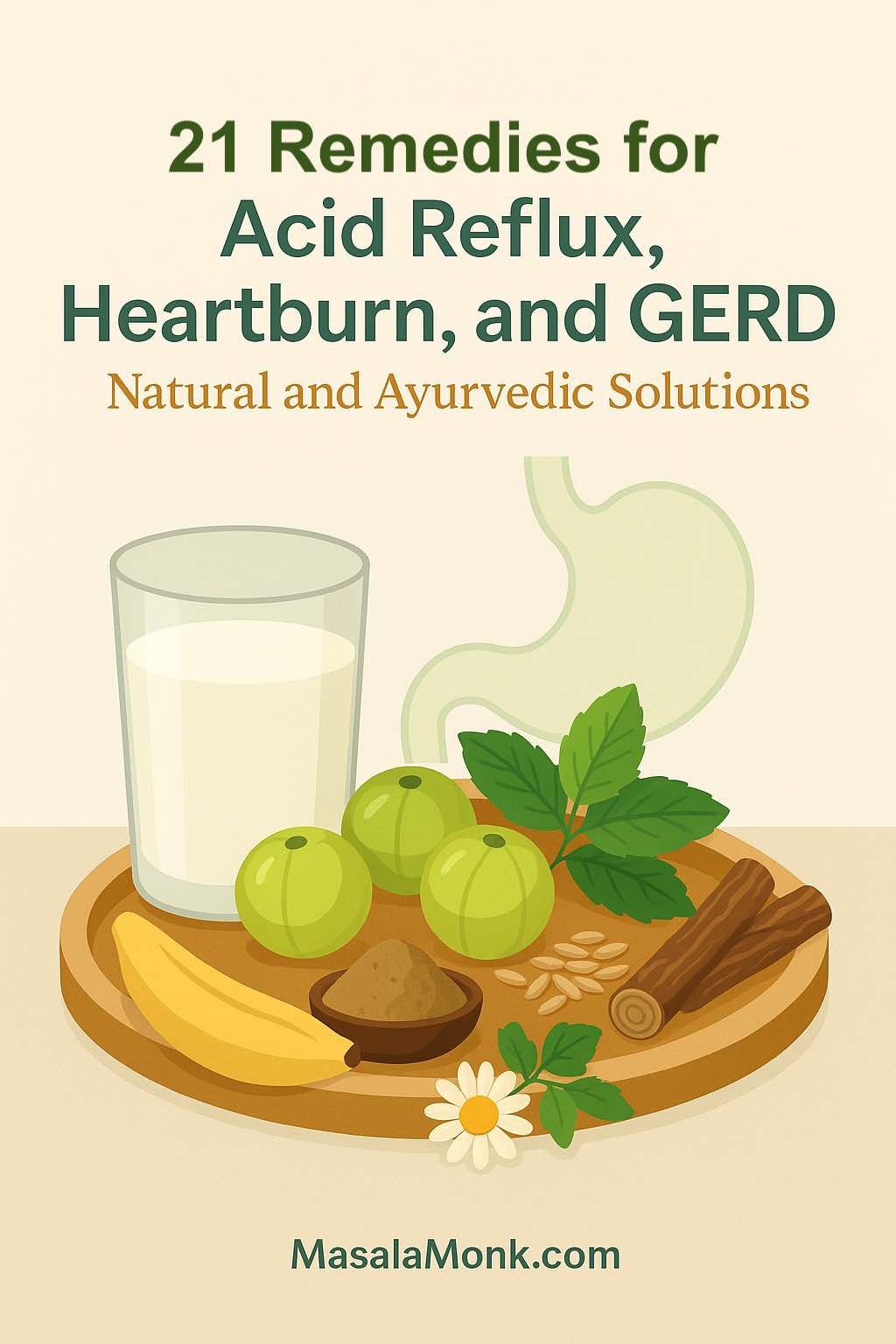
If you’ve ever felt that burning sensation rising from your chest to your throat after a meal, you’re not alone. Acid reflux, heartburn, and GERD (gastroesophageal reflux disease) are among the most common digestive issues worldwide. In fact, studies suggest that over 20% of adults experience reflux symptoms at least once a week. For some, it’s just an occasional annoyance. For others, it can disrupt sleep, make eating uncomfortable, and affect daily life.
Why Do We Get Acid Reflux?
At its core, reflux happens when the lower esophageal sphincter (LES)—a valve between your stomach and esophagus—relaxes when it shouldn’t. This allows stomach acid to travel upward, causing that burning or sour sensation. Factors like overeating, spicy or fried food, stress, pregnancy, or even lying down too soon after eating can all contribute.
- Heartburn is the symptom—the burning feeling in the chest.
- Acid reflux is the condition where acid escapes into the esophagus.
- GERD is chronic reflux, often needing medical attention.
Why Look for Natural and Ayurvedic Solutions?
While medications like antacids, PPIs (proton pump inhibitors), or H2 blockers provide relief, many people worry about long-term side effects or prefer to avoid daily dependence on pills. That’s where natural remedies, Ayurvedic wisdom, and holistic approaches step in. These solutions often:
- Provide quick relief when acidity strikes suddenly.
- Offer long-term digestive support by balancing the body naturally.
- Address lifestyle and dietary habits, not just the symptoms.
- Can be safer for special cases like pregnancy, where many medicines aren’t recommended.
A Balanced Approach
It’s important to remember: no single remedy works for everyone. What helps one person may not help another, and some remedies (like baking soda or apple cider vinegar) may not be suitable for long-term use. The goal of this guide is to give you a toolkit of 21 proven, practical, and safe remedies—ranging from quick fixes to Ayurvedic herbs and modern natural supplements.
By the end of this article, you’ll know:
- How to calm acidity immediately when you need quick relief.
- Which dietary and lifestyle changes make reflux less frequent.
- Which Ayurvedic herbs and Western natural remedies support digestion.
- The truth about acidic vs. alkaline foods and how they affect reflux.
Think of this as your one-stop reference for managing reflux naturally—whether you’re at home, at work, or traveling.
Quick Remedies for Instant Relief
Sometimes, acid reflux doesn’t wait—it hits suddenly after a heavy meal, late at night, or even first thing in the morning. While long-term lifestyle and diet changes are the real key to reducing GERD, there are a few natural, quick fixes you can try for immediate comfort.
Here are some practical remedies you can reach for when the burn strikes:
1. Drink Cold Milk or Buttermilk 🥛
- Why it works: Milk coats the stomach lining and temporarily neutralizes excess acid. Buttermilk contains lactic acid that can calm irritation.
- How to use: Drink a small glass (not too large, as too much can trigger more acid). For an extra boost, add a pinch of ground fenugreek or cumin powder.
- Tip: Avoid full-fat or flavored milk (chocolate, sweetened), as high fat and sugar can worsen reflux.
2. Baking Soda Water (Natural Antacid) 🥤
- Why it works: Baking soda (sodium bicarbonate) neutralizes stomach acid within minutes. It’s one of the fastest natural fixes.
- How to use: Mix ½ teaspoon of baking soda in a glass of lukewarm water and sip slowly.
- Caution: Use occasionally, not daily. High sodium can affect blood pressure, and frequent use may upset mineral balance.
Read more: Baking Soda for Heartburn, Acid Reflux, & GERD
3. Eat a Banana or an Apple Slice 🍌🍏
- Why it works: Bananas are mildly alkaline and contain pectin, which aids digestion. Apples (especially sweet varieties) can help absorb acid and calm the stomach.
- How to use: Eat one ripe banana or a few slices of apple when reflux hits.
- Tip: Avoid unripe bananas (too starchy) or sour apple varieties (like Granny Smith), as they may worsen symptoms.
Read More: Bananas Good or Bad for Heartburn and Acid Reflux
4. Chew Gum 🍬
- Why it works: Chewing stimulates saliva, which is naturally alkaline. This helps wash acid back down into the stomach.
- How to use: Pop a piece of sugar-free gum (mint-free, as peppermint may relax the LES valve and worsen reflux).
- Best time: After meals or when symptoms start.
5. Sip Ginger or Chamomile Tea 🍵
- Why it works:
- Ginger reduces nausea and soothes the stomach.
- Chamomile calms inflammation and stress, both of which can worsen reflux.
- How to use: Steep fresh ginger slices or chamomile flowers/tea bag in hot water for 5–10 minutes. Sip warm (not too hot).
- Tip: Avoid caffeinated teas (like black or green) if you’re prone to acidity.
Read More: Ginger for Heartburn and Acid Reflux: Natural Relief or Digestive Myth?
6. Try Fennel Seeds (Saunf) or Jeera Water 🌿
- Why it works: Both fennel and cumin aid digestion, reduce bloating, and calm acidity.
- How to use:
- Chew ½ teaspoon fennel seeds after meals.
- Or boil 1 tsp cumin seeds in water, strain, and sip lukewarm.
Also Read: Fennel Seeds for Digestion, Freshness, and Calm
7. Aloe Vera Juice 🌱
- Why it works: Aloe vera soothes irritation and inflammation in the esophagus.
- How to use: Drink ½ cup aloe vera juice (unsweetened, food-grade) before meals.
- Caution: Some aloe products act as laxatives—look for “decolorized, purified” aloe vera juice.
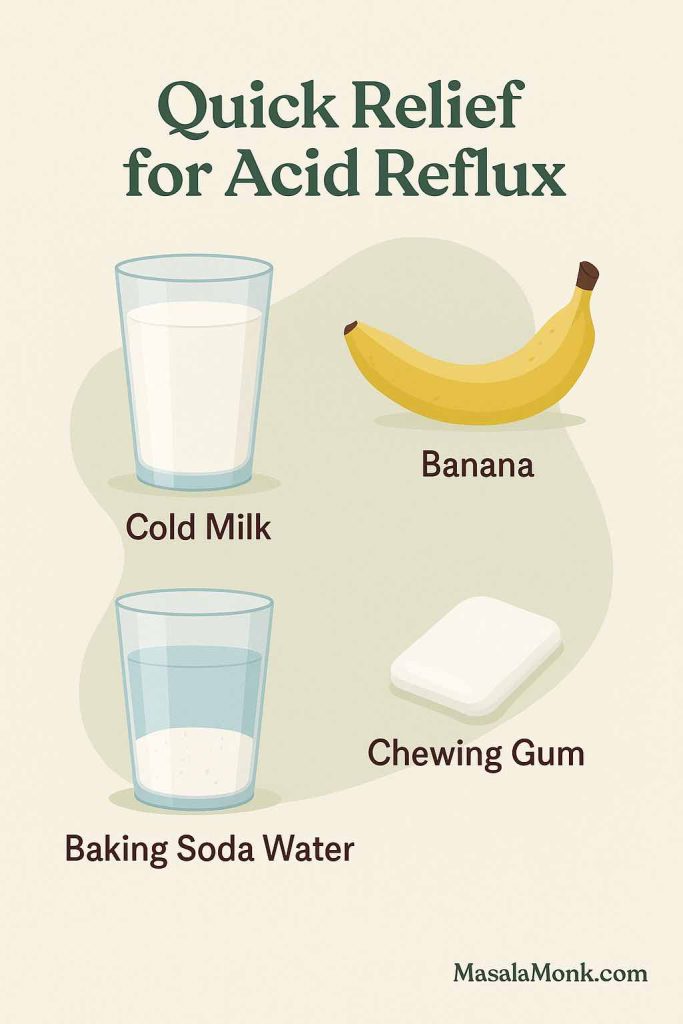
Quick Relief Checklist ✅
When acid reflux strikes suddenly:
- 🥛 Try a small glass of cold milk or buttermilk.
- 🥤 Neutralize with baking soda water (occasional use only).
- 🍌 Grab a banana or a slice of apple.
- 🍬 Chew sugar-free gum to stimulate saliva.
- 🍵 Sip ginger or chamomile tea.
- 🌿 Chew fennel seeds or drink jeera water.
- 🌱 Calm irritation with aloe vera juice.
These remedies may not “cure” GERD, but they buy you comfort in the moment—so you can carry on with your day while you work on long-term prevention.
Lifestyle & Preventive Measures
Acid reflux and GERD often aren’t just about what you eat, but how and when you eat, how you sleep, and how you manage stress. Simple daily adjustments can make a huge difference in reducing symptoms naturally.
Here are the most effective lifestyle habits to prevent reflux:
1. Eat Smaller, More Frequent Meals 🍽️
- Why it helps: Large meals put pressure on the lower esophageal sphincter (LES), making it easier for acid to escape upward.
- How to apply: Instead of 2–3 heavy meals, break your day into 4–5 lighter meals. Stop eating when you feel about 80% full.
- Tip: Listen to your body—overeating, even on “healthy” food, can trigger reflux.
2. Avoid Trigger Foods (Know Your Triggers) 🚫🌶️☕🍷
- Common culprits: Spicy curries, fried food, citrus fruits, tomatoes, chocolate, onions, coffee, alcohol, carbonated drinks, and peppermint.
- How to apply: Keep a food journal. Note what you ate before an episode—patterns appear quickly.
- Tip: Everyone’s triggers are different—what bothers one person may be fine for another.
Foods that Worsen Acid Reflux and Heartburn would help you understand this better.
3. Don’t Lie Down Right After Eating 🛏️
- Why it helps: Gravity helps keep stomach acid down. Lying flat too soon after meals lets acid creep upward.
- How to apply: Wait 2–3 hours after eating before lying down or going to bed.
- Practical hack: If you work late, make dinner lighter and finish at least 2 hours before bedtime.
4. Elevate Your Head While Sleeping 🌙
- Why it helps: Lying flat allows stomach acid to flow back. Elevating the head by 6–8 inches keeps acid where it belongs.
- How to apply: Use a wedge pillow, elevate the bed frame, or add extra pillows (though wedge pillows work best).
- Bonus tip: Sleeping on your left side may reduce reflux more than on the right.
5. Maintain a Healthy Weight ⚖️
- Why it helps: Extra abdominal weight increases pressure on the stomach, pushing acid upward.
- How to apply: Even a 5–10% weight reduction can significantly improve reflux in overweight individuals.
- Tip: Focus on gradual, sustainable changes—balanced diet, portion control, regular activity.
6. Manage Stress & Tension 🧘♀️
- Why it helps: Stress doesn’t cause reflux directly, but it worsens symptoms and may make the stomach produce more acid.
- How to apply: Yoga, meditation, deep breathing, or even short mindful breaks during the day.
- Simple trick: Try the 4-7-8 breathing method—inhale for 4 seconds, hold for 7, exhale for 8. Repeat 3 times.
7. Quit Smoking & Limit Alcohol 🚭🍺
- Why it helps: Both weaken the LES, making reflux worse. Alcohol also irritates the stomach lining.
- How to apply: If quitting feels overwhelming, start by reducing frequency and tracking improvements in your reflux symptoms.
Do Read: Smoking and GERD: Can Cigarettes Cause Heartburn?
8. Stay Hydrated, but Smartly 💧
- Why it helps: Water helps digestion and flushes acid. But too much liquid at once may distend the stomach.
- How to apply: Sip water through the day, rather than gulping large amounts during meals.
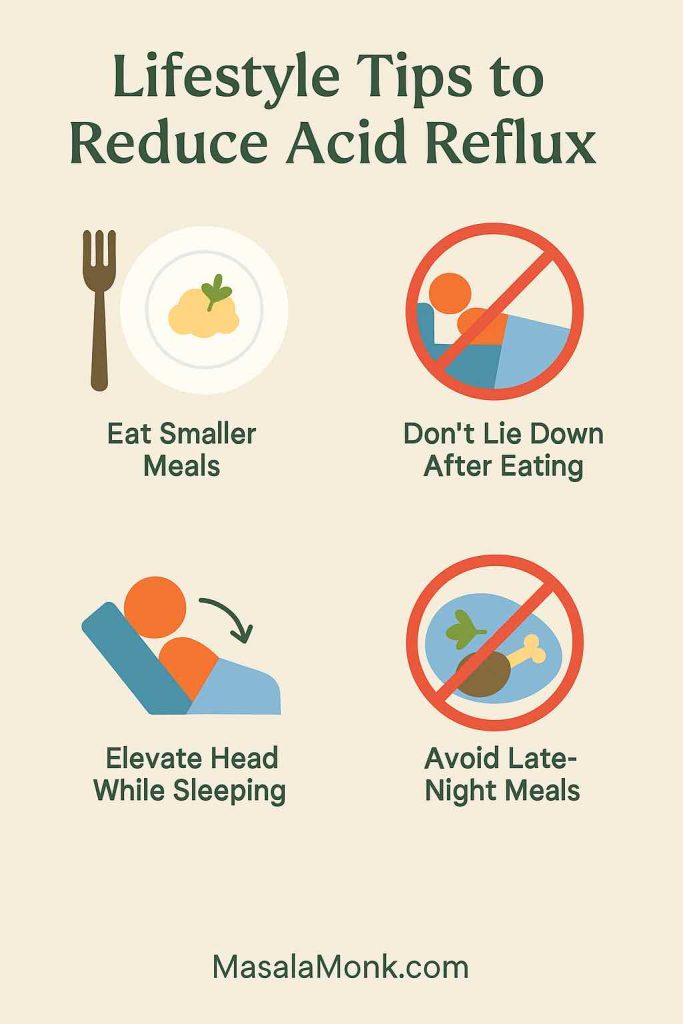
✅ Lifestyle Recap
- 🍽️ Smaller meals
- 🚫 Avoid triggers
- 🕒 No lying down after meals
- 🌙 Elevate head, sleep left side
- ⚖️ Healthy weight
- 🧘 Manage stress
- 🚭 Quit smoking, cut alcohol
- 💧 Sip water smartly
Lifestyle changes aren’t overnight fixes—but they’re the most powerful long-term remedy for reflux. Even if you only adopt 2–3 of these, you’ll likely notice improvements within weeks.
Ayurvedic & Herbal Remedies
Ayurveda, India’s 5,000-year-old system of natural healing, has long recognized Amla, Licorice, Triphala, and Tulsi as powerful allies against “Amlapitta” (the Ayurvedic term for hyperacidity). Similarly, Western herbal medicine often uses slippery elm, marshmallow root, and chamomile to soothe the digestive tract.
Here are the most trusted remedies and how you can use them safely:
1. Triphala (Three Fruits Blend) 🌿
- Why it helps: Triphala balances digestion, supports bowel regularity, and reduces “Pitta” (heat/acidity) in Ayurvedic terms.
- How to use: Take ½–1 teaspoon of Triphala powder with warm water at bedtime.
- Tip: Start small, as it has mild laxative effects.
2. Licorice Root (Mulethi / Yashtimadhu) 🌱
- Why it helps: Forms a soothing coating on the esophagus and stomach lining, reducing acid irritation. Some studies show it strengthens the LES.
- How to use: Chew a small piece of dried licorice root or take deglycyrrhizinated licorice (DGL) tablets before meals.
- Caution: Regular licorice may raise blood pressure—DGL form is safer for long-term use.
3. Amla (Indian Gooseberry) 🍈
- Why it helps: Rich in Vitamin C and antioxidants, Amla has cooling properties that counter excess stomach heat.
- How to use: Drink 2–3 teaspoons of fresh Amla juice diluted with water in the morning, or consume Amla powder with honey.
- Bonus: Supports overall digestion, immunity, and metabolism.
4. Tulsi (Holy Basil) Leaves 🌿
- Why it helps: Tulsi is considered a natural antacid and stress-reliever. It neutralizes stomach acid and calms the mind, which can reduce stress-triggered reflux.
- How to use: Chew 4–5 fresh leaves after meals, or make Tulsi tea by steeping leaves in hot water.
- Tip: Combine with honey for extra soothing effect.
Suggested Read: 8 Anti-Inflammatory Drinks for Health & Wellness
5. Jeera (Cumin) Water 🌱
- Why it helps: Improves digestion, reduces bloating, and relieves acidity. Cumin stimulates enzyme production that aids food breakdown.
- How to use: Boil 1 teaspoon cumin seeds in 1 cup water, strain, and sip warm after meals.
6. Fennel Seeds (Saunf) 🌸
- Why it helps: Fennel has cooling, carminative properties—reduces bloating and acidity while freshening breath.
- How to use: Chew ½ teaspoon fennel seeds after meals or brew into fennel tea.
Do read: 8 Benefits of Saunf or Fennel Seeds
7. Aloe Vera Juice 🌱
- Why it helps: Aloe vera reduces inflammation in the esophagus and soothes burning.
- How to use: Drink ½ cup (120 ml) of unsweetened, purified aloe vera juice before meals.
- Caution: Ensure it’s labeled “decolorized” to avoid laxative effects.
8. Slippery Elm (Western Herbal) 🌿
- Why it helps: High in mucilage, it coats the esophagus and stomach, creating a protective layer against acid irritation.
- How to use: Mix 1 teaspoon slippery elm powder in warm water or take as lozenges/tablets.
9. Marshmallow Root 🌱
- Why it helps: Similar to slippery elm, marshmallow root forms a soothing gel that protects mucous membranes.
- How to use: Drink marshmallow tea (steep dried root in water) or take as capsules.
10. Chamomile Tea 🌼
- Why it helps: Reduces stress, calms inflammation, and may decrease acid production.
- How to use: Steep 1 teaspoon dried chamomile flowers in hot water for 5 minutes. Sip warm before bedtime.
Also ReaD: Himalayan Chamomile + Lemongrass Tea: A Calming Cup from the Mountains
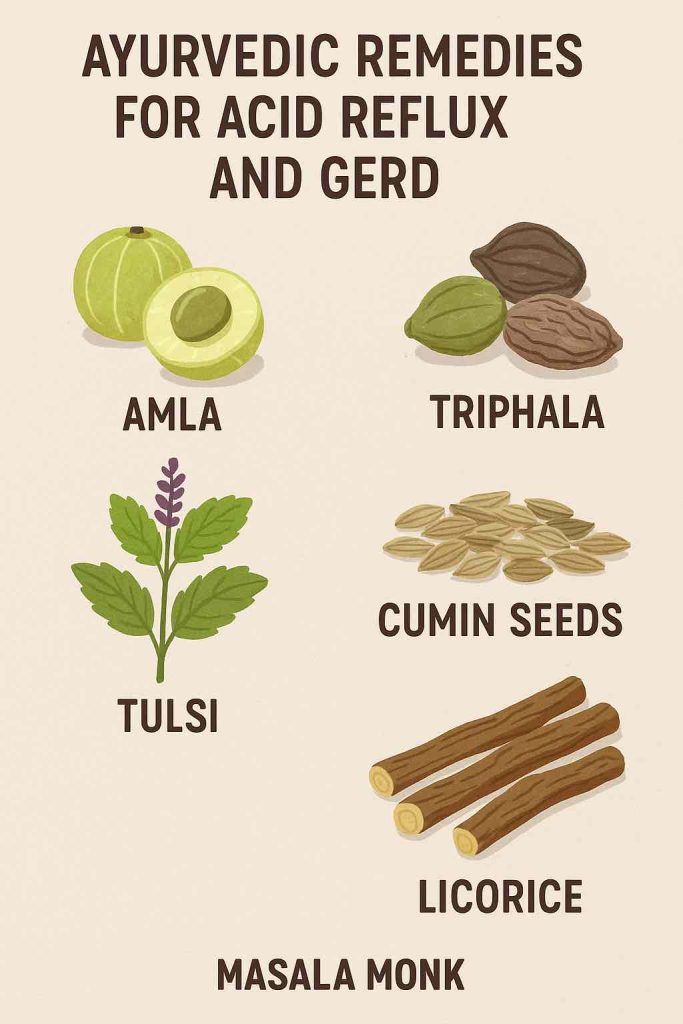
✅ Ayurvedic & Herbal Recap
- 🌿 Triphala, Licorice, Amla, Tulsi → traditional Ayurvedic support
- 🌱 Cumin, Fennel, Aloe Vera → kitchen/home-based remedies
- 🌿 Slippery Elm, Marshmallow, Chamomile → Western natural allies
These remedies are gentle, holistic, and often suitable for long-term use—though results can vary. Always test one at a time to see how your body responds.
Natural Supplements & Western Approaches
Not everyone wants to rely on prescription drugs like PPIs (proton pump inhibitors) forever. Thankfully, research is growing around natural supplements that can help reduce reflux symptoms. These don’t replace medical care, but they can be useful as part of a holistic strategy.
Here are some of the most promising:
1. Probiotics 🦠
- Why they help: Restore balance to gut bacteria, which can improve digestion, reduce bloating, and regulate stomach emptying. Some strains may reduce reflux episodes by decreasing gas pressure on the LES (lower esophageal sphincter).
- Evidence: Clinical reviews show probiotics may help heartburn, indigestion, and gas in up to 79% of cases.
- How to use: Look for Lactobacillus and Bifidobacterium strains in supplements or consume probiotic-rich foods (yogurt, kefir, kimchi, sauerkraut).
2. Iberogast (Multi-Herb Formula) 🌿
- What it is: A liquid extract containing 9 herbs (including bitter candytuft, chamomile, caraway, and licorice).
- Why it helps: Improves stomach motility (movement), reduces bloating, and calms irritation.
- Evidence: Some people report relief within 30–60 minutes. Supported by clinical studies for functional dyspepsia and reflux.
- How to use: Typically taken as drops in water before meals (follow product dosage).
3. FDgard (Caraway Oil + L-Menthol) 🌱
- What it is: A capsule designed to release peppermint oil and caraway in the small intestine.
- Why it helps: Relieves indigestion, cramping, and bloating.
- Caution: Peppermint can worsen reflux in some people by relaxing the LES—so FDgard helps some but not all.
- Best for: People with indigestion symptoms alongside mild reflux.
4. Melatonin 🌙
- Why it helps: Known as the sleep hormone, melatonin also strengthens the LES and protects stomach lining from acid damage.
- Evidence: Some studies suggest melatonin, combined with omeprazole (a common GERD drug), reduces reflux symptoms more effectively than omeprazole alone.
- How to use: Low-dose melatonin (0.5–3 mg) before bed may help reflux and sleep quality.
- Caution: Always start with the lowest dose; check with your doctor if on other medications.
5. B Vitamins 💊
- Why they help: Long-term PPI use can deplete B12, folate, and B6. Deficiencies may worsen digestive issues.
- How to use: A balanced B-complex or dietary sources (leafy greens, eggs, whole grains).
- Note: Not a direct reflux treatment, but helps if deficiencies exist.
6. Ginger Supplements 🌱
- Why they help: Ginger aids digestion, reduces nausea, and speeds up stomach emptying.
- Best use: Works well for reflux linked with indigestion and nausea.
- Forms: Capsules, tea, or fresh slices in hot water.
✅ Supplement Recap
- 🦠 Probiotics → gut balance, digestion support
- 🌿 Iberogast → multi-herb relief for reflux & bloating
- 🌱 FDgard → caraway & peppermint blend, helps some but not all
- 🌙 Melatonin → strengthens LES, supports sleep
- 💊 B Vitamins → helpful if deficient (especially on PPIs)
- 🌱 Ginger → reduces nausea, improves motility
💡 Important Note: Supplements are not “instant cures.” They’re best used consistently and often alongside lifestyle/diet changes. And because bodies react differently, what works for one person may not for another.
Acidic vs. Alkaline Foods
When it comes to acid reflux, food is medicine—but also sometimes the trigger. You’ve probably heard claims that eating only “alkaline foods” will cure reflux. The reality is more subtle:
- Your body keeps blood pH tightly regulated, no matter what you eat.
- But certain foods feel acidic in the stomach or relax the LES valve, making reflux worse.
- Meanwhile, other foods are naturally soothing and can help neutralize acid or support digestion.
Here’s how to make sense of it:
Foods That Tend to Help (Alkaline-Friendly & Soothing) ✅
These foods are gentle, low-acid, and often recommended for reflux relief:
- Bananas & Melons 🍌🍈 → mildly alkaline, rich in fiber, soothing on the stomach.
- Oatmeal 🥣 → whole-grain, absorbs acid, keeps you full without heaviness.
- Leafy Greens 🥬 (spinach, kale, lettuce) → naturally alkaline, high in minerals.
- Root Vegetables 🥕 (carrots, sweet potatoes, beets) → filling, low in fat and acid.
- Cucumber & Celery 🥒 → hydrating, low-acid, mild on digestion.
- Yogurt & Kefir 🥛 → probiotic-rich, may calm acidity (choose low-fat, unsweetened).
- Nuts & Seeds 🌰 (almonds, flax, chia) → protein & fiber without acidity.
💡 Tip: These foods are not just “alkaline,” they’re also unprocessed, fiber-rich, and low in fat—a big reason they help with reflux.
Do Read: Foods That Help with Acid Reflux and Heartburn
Foods That Commonly Trigger Reflux 🚫
These are either acidic, fatty, or relax the LES, making acid reflux more likely:
- Citrus Fruits & Juices 🍊 (oranges, lemons, grapefruit) → highly acidic.
- Tomato & Tomato Products 🍅 (sauces, ketchup) → acidic, worsen burning.
- Spicy Foods 🌶️ → irritate stomach lining, trigger reflux in many people.
- Fried & Fatty Foods 🍟 (burgers, pizza, chips) → delay stomach emptying, increase acid pressure.
- Chocolate 🍫 → contains caffeine & theobromine, both relax LES.
- Coffee & Caffeinated Tea ☕ → stimulate acid production.
- Alcohol & Carbonated Drinks 🍺🥤 → increase acidity and gas pressure.
- Peppermint & Spearmint 🌿 → relax LES, allowing acid upward.
💡 Tip: Not everyone reacts the same. Keep a food diary to find your personal triggers.
What About Alkaline Water? 💧
- Some studies suggest alkaline water (pH ~9–9.5) may temporarily neutralize stomach acid.
- Works best when combined with a plant-based diet.
- But effects are short-term, and high-pH water daily may not be necessary for everyone.
The Bottom Line on Acidic vs. Alkaline
- The “alkaline diet” won’t magically change your blood pH—it’s a myth.
- But eating more plant-based, fiber-rich, low-acid foods (many of which happen to be alkaline) does reduce reflux symptoms.
- The key isn’t alkalinity alone, but avoiding known triggers, eating balanced meals, and supporting digestion.
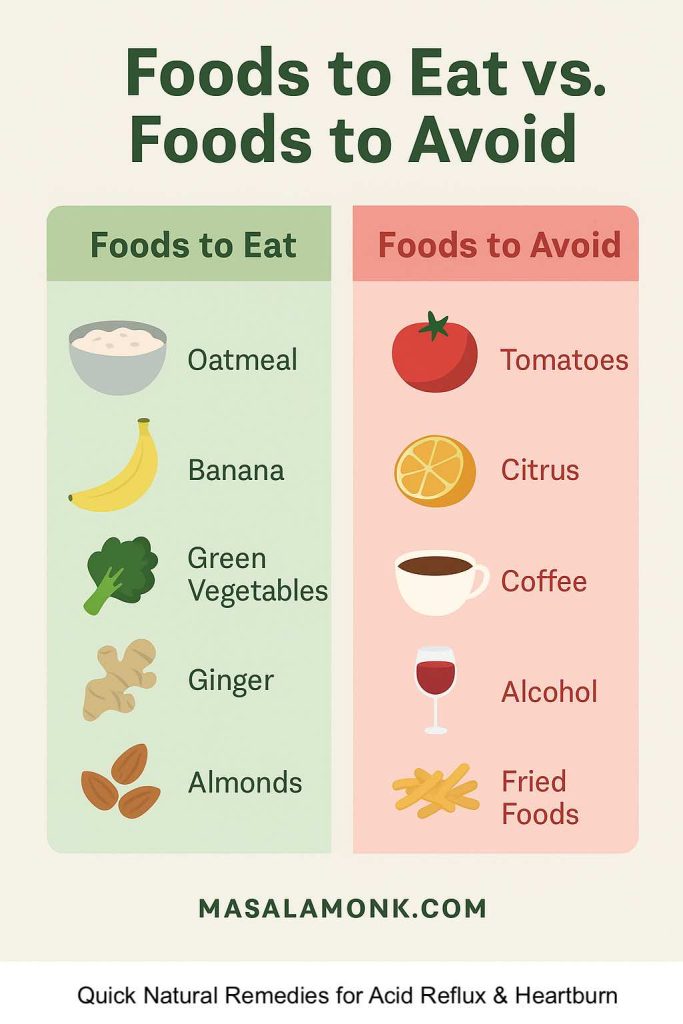
✅ Food Strategy Recap
- Eat: bananas, melons, oatmeal, greens, root veggies, cucumber, yogurt, almonds.
- Avoid/limit: citrus, tomato, spicy/fried foods, chocolate, coffee, alcohol, mint.
- Try alkaline water occasionally, but don’t rely on it as a cure.
Special Cases
Not all reflux is the same. Sometimes it shows up during pregnancy, sometimes as “silent reflux” without heartburn, and sometimes it causes lasting irritation in the esophagus. These special cases need a gentler and more tailored approach.
1. Pregnancy-Safe Remedies 🤰
Pregnancy hormones (especially progesterone) relax the LES valve, while the growing baby adds abdominal pressure—making heartburn very common. But most medications aren’t safe, so natural fixes are key.
✅ What helps during pregnancy:
- Oatmeal & Whole Grains 🥣 → filling, non-acidic, prevent empty-stomach burn.
- Almond Milk 🥛 → cooling, naturally alkaline.
- Ginger Tea 🍵 → eases nausea + indigestion (but avoid strong amounts).
- Smaller, frequent meals 🍽️ → prevents stomach overload.
- Sleeping on your left side 🌙 → reduces nighttime reflux.
⚠️ What to avoid:
- Large meals before bedtime
- Strong herbal remedies without doctor approval (e.g., licorice, aloe vera in pregnancy may not be safe)
Do Read: Heartburn and Acid Reflux During Pregnancy
2. Silent Reflux (Laryngopharyngeal Reflux / LPR) 🗣️
Unlike typical acid reflux, silent reflux often doesn’t cause heartburn. Instead, it irritates the throat, vocal cords, and airways. Common symptoms: chronic cough, sore throat, hoarseness, lump-in-throat feeling.
✅ What helps with LPR:
- Slippery Elm or Marshmallow Root Tea 🌿 → coats and protects throat.
- Alkaline Water + Plant-Based Diet 🌱 → shown in some studies to help soothe LPR.
- Voice Rest & Hydration 💧 → reduces irritation.
- Avoid acidic drinks (coffee, citrus, sodas) 🚫.
⚠️ Extra care: Since LPR often goes undiagnosed, persistent symptoms should be checked by an ENT or gastroenterologist.
3. Healing the Esophagus (After Acid Damage) 🩺
Chronic reflux can inflame and damage the esophagus (esophagitis). Beyond reducing acid, soothing and healing remedies can help recovery.
✅ Soothing options:
- Aloe Vera Juice 🌱 → reduces inflammation, calms irritation.
- Chamomile Tea 🌼 → anti-inflammatory, calming.
- Licorice (DGL) 🌿 → helps rebuild mucous lining.
- Bone Broth or Collagen-Rich Soups 🍲 → support tissue repair.
⚠️ When to see a doctor: Difficulty swallowing, chest pain, or unexplained weight loss could mean more serious conditions (like Barrett’s esophagus) and require medical care.
✅ Special Cases Recap
- Pregnancy → oatmeal, almond milk, ginger tea, small meals.
- Silent Reflux (LPR) → slippery elm, alkaline diet, hydration, avoid acidic drinks.
- Esophagus Healing → aloe vera, chamomile, licorice (DGL), collagen-rich foods.
When to See a Doctor & Conclusion
When to See a Doctor 🩺
Natural remedies can do a lot, but they’re not a substitute for professional care if symptoms are severe or persistent. It’s time to check in with a doctor if you notice:
- 🔴 Heartburn or acid reflux more than 2–3 times a week
- 🔴 Difficulty swallowing, or food feeling “stuck”
- 🔴 Chronic cough, hoarseness, or sore throat that won’t go away
- 🔴 Unexplained weight loss or loss of appetite
- 🔴 Chest pain that mimics heartburn but could be heart-related
- 🔴 Vomiting blood or black/tarry stools (urgent signs of bleeding)
⚠️ If you’re pregnant, elderly, or on other medications, always check before adding supplements or herbal remedies.
The 21 Remedies Recap ✅
For quick relief:
- Cold milk / buttermilk
- Baking soda water
- Banana or apple slice
- Chewing gum
- Ginger or chamomile tea
- Fennel seeds / jeera water
- Aloe vera juice
Lifestyle & preventive steps:
8. Eat smaller meals
9. Avoid trigger foods
10. Don’t lie down after meals
11. Elevate head while sleeping (or sleep left side)
12. Maintain a healthy weight
13. Manage stress
14. Quit smoking, limit alcohol
15. Stay hydrated smartly
Ayurvedic & herbal support:
16. Triphala
17. Licorice (DGL)
18. Amla
19. Tulsi
20. Slippery elm / marshmallow root / chamomile
Supplements & special care:
21. Probiotics, Iberogast, melatonin, ginger capsules, or B vitamins
Conclusion 🌿
Acid reflux, heartburn, and GERD don’t have to control your life. From a glass of buttermilk in your kitchen, to Ayurvedic herbs like triphala, to modern supplements like probiotics, there are 21 natural ways to find relief and healing.
Remember:
- For immediate comfort, reach for quick fixes like banana, fennel, or chamomile tea.
- For long-term balance, focus on lifestyle changes, Ayurvedic herbs, and supplements.
- And above all, listen to your body—what works for one person may not work for another.
Your digestive health is a journey, and small, consistent steps can lead to lasting relief. 🌱✨
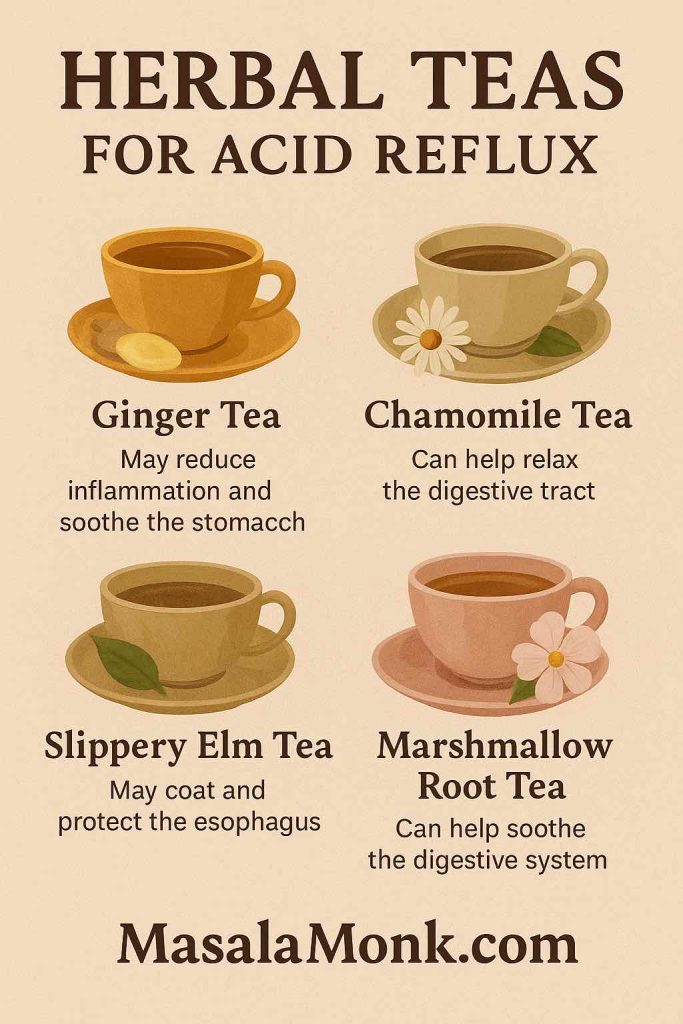
📝 FAQs for the Blog
1. What is the difference between acid reflux, heartburn, and GERD?
- Acid reflux: When stomach acid flows back into the esophagus.
- Heartburn: The burning chest sensation caused by reflux.
- GERD (Gastroesophageal Reflux Disease): Chronic, frequent acid reflux that may require medical attention.
2. Can natural remedies cure acid reflux permanently?
Natural remedies can manage and reduce symptoms, especially when combined with lifestyle changes. But if GERD is severe or caused by underlying issues (like a hiatal hernia), medical treatment may still be necessary.
3. What is the fastest home remedy for acid reflux?
Some quick fixes include baking soda water, cold milk, banana, or chewing sugar-free gum. These offer short-term relief but are not long-term cures.
4. Are Ayurvedic remedies safe for daily use?
Yes, remedies like Triphala, Amla, Tulsi, and cumin water are safe for most people when used in moderation. However, herbs like licorice should be taken in DGL form or with medical guidance, especially for people with high blood pressure.
5. Can probiotics help with acid reflux?
Yes, probiotics may improve digestion and reduce reflux symptoms by balancing gut bacteria. Strains like Lactobacillus and Bifidobacterium are most studied.
6. Is milk good for acid reflux?
Cold milk or buttermilk can give temporary relief by soothing the stomach lining. But full-fat milk may worsen reflux for some people—low-fat options are better.
7. What foods should I avoid if I have acid reflux?
Common triggers include citrus fruits, tomatoes, spicy food, fried food, chocolate, coffee, alcohol, and carbonated drinks. Triggers vary, so keeping a food diary helps.
8. Can pregnant women use natural remedies for reflux?
Yes—safe remedies include oatmeal, almond milk, ginger tea, small frequent meals, and sleeping on the left side. Avoid strong herbs and always consult a doctor before supplements.
9. What are the best natural remedies for silent reflux (LPR)?
Helpful remedies include slippery elm tea, marshmallow root, alkaline water, and a mostly plant-based diet. Avoid acidic drinks like coffee and soda.
10. When should I see a doctor for acid reflux?
If you have reflux more than 2–3 times a week, difficulty swallowing, chronic cough, chest pain, or unexplained weight loss, consult a doctor. Persistent reflux may lead to complications.










[…] Also read: 21 Remedies for Acid Reflux, Heartburn, and GERD: Natural and Ayurvedic Solutions […]
[…] Also Read: 21 Remedies for Acid Reflux, Heartburn, and GERD: Natural and Ayurvedic Solutions. […]
[…] begin with everyday changes that compound over time. For a friendly, food-first framework, skim our remedies for acid reflux guide. Then, refine your plate by identifying foods that worsen acid reflux and choosing from foods […]